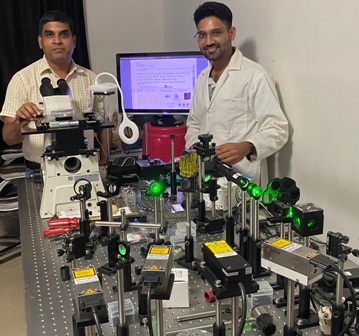
The researchers at Indian Institute of Technology (IIT) Mandi in collaboration with scholars from University of Cincinnati, USA, have developed an efficient method to study internal structure and functions of an important component of living cells.
Explaining the process the researchers said, “A lysosome is an essential component of a living cell and interacts with other cell components like mitochondria. The lysosomes destroy invading viruses and bacteria.”
“The dysfunction of lysosomes can cause several diseases including neurodegenerative disorders, immune system disorders, cancer etc and the analysis and tracking of its structure and function can help in predicting risks of certain diseases and guide development of pharmaceutical for treatment.”
The researchers have used metal nano clusters in a method called Structured Illumination Microscopy to observe the nano dimensional features and functions of lysosomes and their interactions with an important cell organelle, mitochondria.
Prof. Chayan K. Nandi of IIT Mandi, said, “Lysosomes are about a micron in size, i.e., a thousandth of a millimeter, with its internal structure in the order of 200 nanometers (one thousandth of a micron. The regular microscope cannot pick up the details of structures of this size but we have used a technique called Structured Illumination Microscopy (SIM) to discern the internal structures of lysosomes.”
Elaborating the process Aditya Yadav, a research scholar associated with the project said , “We modified these nano clusters with a bio compatible protein called bovine serum albumin and used them to track the dynamics of lysosomes in brain organoid, a process by which lysosomes recycle damaged mitochondria inside cells.”
The results of this work have been published in the prestigious journal – American Chemical Society Materials Letters jointly by Prof. Chayan K. Nandi and Aditya Yadav from the school of basic sciences of IIT Mandi in association with Dr. Kangqiang Qiu, Dr. Zhiqi Tian, Dr. Ziyuan Guo, Dr. Donglu Shi, and Dr. Jiajie Diao from the University of Cincinnati, USA.
